Aug, 2010
Four-year-old Ahmad and two-year-old Qusai, holding tight to their mother’s hands, walk into one of the largest hospitals in the governorate of Hebron.
The Hmeidat brothers are being treated for upper respiratory problems.
Dr. Issa Qdimat has been monitoring their recovery. “This transitional period from winter to spring is one of the main causes of cold, influenza, and infections. Ahmad had tonsillitis and was in pain when his mother first brought him to the hospital. His brother Qusai had a severe cold and a bad cough.” Dr Qdimat says he can see a great improvement in their health with Omnicef.
The hospital is one of many that receive antibiotics, which Anera distributes on behalf of the International Orthodox Christian Charities (IOCC). Over the past several months, more than 800 children have benefited from the donated medicine, which helps relieve respiratory and urinary tract infections and inflammations.
Changing seasons are not the only cause for respiratory problems in the surrounding villages. There are several stone quarries scattered around the area, with some even squeezed between houses. Dr. Qdimat suggests the stone quarry next to Ahmad’s house may be causing his health issues.
“The villagers often build next to the quarries or allow cattle inside their homes. These bad practices can provoke allergies and infections,” explains Dr Qdimat. “As members of the Red Crescent Society, we are trying to educate families about healthy living habits.”
Financial constraints weigh on the community so the hospital provides medication for free or at a minimal cost, depending on a family’s financial situation. Social workers conduct periodic surveys of living conditions and estimate that some 370 families currently are being treated for free.
“Ahmad and Qussai’s parents could never afford to give their children this antibiotic if it weren’t free,” said Dr Qdimat. “I examine 10-20 children every day from underprivileged families. I only have 20 bottles of Omnicef left and I expect they will be all gone by the end of the day.”
These circumstances can be seen in clinics and hospitals across the West Bank, where donations of key medicines are essential to helping impoverished families, especially children, lead healthier lives.


